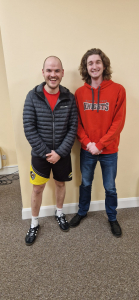Eli Williamson: A Cultural Profile

Hi everyone,
This blog will be a bit different than my other ones. I have been tasked with interviewing someone from a different culture to learn more about them. As soon as I realized I needed to write this, one man came to mind instantly: Eli Williamson. Eli is a friend that I made here in Ireland. He was one of the very first people I met at the Dochas Christian Society meetings and invited me to come to his church on Sundays, where I ended up going every Sunday for the rest of the semester! Eli is one of those rare individuals that makes his presence known in a room without being overbearing. He’s quick to a joke or a conversation, and if he’s talking, it’s a guarantee that his laugh will follow. Eli’s boisterous laugh resembles the call of an American crow, but it’s a laugh that you want to hear because it’s always genuine. Eli is Scottish, but more specifically from Lerwick in the Shetland Islands. The Shetland Islands are unique because they are the northernmost islands of the United Kingdom– so north that they are in line with Norway!
Before I get into the interview, I’ll explain how I’m structuring this blog. I did not write down exact answers from Eli, so I am merely paraphrasing his answers, but I had him verify that the words I attribute to him are the truth. I wrote all of the questions hoping to learn more about Eli and his culture. The blog’s structure will go like this: question, Eli’s answer, my reflections on his answers. Eli told me he loves to talk about his culture, and I hope my interview shows his passion for his homeland.
- Describe your family: Number of siblings, parents, wife, etc.
- Eli’s answer: Eli has two parents, both of whom are in the paint business. He has six siblings, one of whom is actually a cousin that his family adopted. He also has a lovely wife named Elin.
- My response/reflection: I find it very interesting that Eli’s parents own their own business because my parents are business owners as well. I have also had the privilege of meeting Eli’s wife, Elin. Elin is a wonderful Welsh woman with a thick Welsh accent. She works in a Christian ministry that specializes in reaching students across the college campuses of Ireland. They make a great couple.
- What values did your family hold and impart to you?
- Eli grew up in a Christian household, meaning he grew up with Christian values. When I prompted him to be more specific, he answered, “You are known by your fruits.” Eli’s parents instilled the importance of how he ought to conduct himself with love, joy, peace, patience, kindness, goodness, faithfulness, gentleness, and self-control (Galatians 5:22). Considering Eli’s parents were also business people, he grew up in a house that emphasized the value of hard work, persistence, and making your own way.
- When I look at Eli, it’s easy to see a man of great faith. Yes, he is not perfect, but he exemplifies Christian love, joy, peace, patience, kindness, goodness, faithfulness, gentleness, and self-control every time I see him. I also grew up in a household that valued hard work and persistence. Eli talked to me about how he never had an allowance, and if he wanted money for something, he had to work for it by sweeping floors or mixing paint for his parent’s business, even as young as eight years old. I also grew up without an allowance. My parents were disciples of Dave Ramsey, so I earned a “commission.” As soon as Eli mentioned that he swept floors for his Dad’s business, I felt a surge of camaraderie well up from within me– I, too, swept floors for my Dad’s company all the time. In fact, my Dad, on more than one occasion, said to me, “You wanna run the company someday? Pick up a broom.” This statement’s point was less about becoming the company owner but about the importance of servant leadership– something that I see in Eli.
- What is your job? Dream job?
- Eli is a salesman for a luxury shoe brand in a store in the Galway Mall. Unfortunately, I did not get the specifics of what shoes he sells, but I know they are pricey! Eli enjoys his job as a shoe salesman, but his dream job would be to buy and sell things on eBay full-time. Essentially, Eli would want to be a flipper, buying things cheap and selling them for a profit.
- Eli is a natural salesman. It’s just in his demeanor– the way he speaks, the questions he asks, and the details he catches on to. It is easy to see how his sales skills also transfer to his ability to talk to people about Jesus.
- What is your religion?
- Eli told me that he is a Bible-believing Christian who believes that God created us and sent his Son, Jesus, to redeem us from our sins.
- I knew Eli was a Christian, but I hoped he would identify with a particular denomination for his beliefs. Instead, based on our conversations from the past and what I know about him, I believe that his beliefs are most in line with those of a Baptist.
- What is the role of men/women in your society?
- Eli replied that men and women hold “traditional” roles. Most men work in fishing, agriculture, or the oil industry. Men still hold the role of providers, whereas women are in more of a supporting role. Some women work around the home, and some have careers. He also mentioned that knitting is incredibly popular among most women and can often be a secondary source of income for families.
- I think the roles of men and women in Eli’s culture are very similar to mine. In my opinion, men are still definitely seen as the providers, but women are caught in a limbo phase– some have careers, some are stay-at-home Moms, and some do a little bit of both!
- What is the most popular form of entertainment in your society?
- Football (Soccer). Everybody cares about football. Eli also mentioned that the Shetland Islands have Europe’s largest oil terminal (Sullom Voe), and because of that, the communities on the islands get large sums of money for the oil rights. Why is this relevant to sports and entertainment? A lot of the oil money got invested into state-of-the-art recreation centers on the islands, and in fact, the Shetland Islands have the largest amount of rec centers per capita in the world!
- From my understanding, the United States sports culture and that of the Shetland Islands are very similar. People in both cultures are borderline obsessed with sports. Eli’s descriptions of how the communities on the Shetland Islands were affected by the oil money reminded me a lot of the North Dakota oil boom towns of the 2000s and 2010s.
- What is considered the most respectful/disrespectful in your society?
- Eli explained that the Shetland Islands have a “small-town vibe” and that kindness, communication, and reputation are all vital. To be kind and talkative is respectful; doing the opposite is disrespectful. A person’s reputation is significant in the Shetland Islands.
- I agree that this is similar to my culture but also different. Perhaps it’s a generational thing, but people seem to be much more accepting of those who don’t care to be talkative or communicate in public. Maybe it’s the smartphones…
- What do you think are the most commonly held misconceptions of your culture?
- People are stingy with their money (true, but because of a concern about being responsible with their money). The food is all very heavy and deep-fat-fried (mostly true– Eli describes it as “fisherman food”). Everyone frolics around in kilts playing the bagpipes all the time (untrue, but it does happen occasionally). Everybody sounds like Mel Gibson in Braveheart (untrue; nobody sounds like him).
- I thought that these were a nice mix of serious and comedic.
- What are your stereotypes of United States citizens?
- Eli informed me that from his experience, all Americans are friendly and outgoing but also terribly LOUD. Americans always seem to be searching for their identity, whether it’s searching for their “true selves” or their genealogical heritage. Americans also tend to be wealthy, but the mindset around wealth is also different. According to Eli, if someone is financially successful in his culture, they are sort of discriminated for it– jealousy and envy play a role in creating an “us and them”/”rich vs. poor” mentality. In the US, however, if someone is financially successful, their persona and wealth are glorified.
- Wow. Some things definitely clicked for me as I talked to Eli about this. Yes, I knew Americans are loud. I think that the aura of our freedom follows us wherever we go. I was amazed by the observation that Americans are always searching for their identity. Isn’t that so true? I know I’ve experienced the search for my identity (that’s why I ended up in Ireland), and it seems like everyone my age is searching for who they are. I think that this can be attributed to a variety of factors, but the main one is that my generation is the first to grow up and be able to experience life without actually experiencing it. Let me explain: my generation has always had the internet. We’ve always been able to ask our questions and have them answered within seconds. Through this extreme consumption of information, my generation has crippled itself– we worry too much about the possible outcomes of our decisions because we can find all of the answers online. In this way, we’ve come to passively experience our lives. Why risk doing something if we can get the second-hand experience of watching someone else do it? There’s no risk of failure in watching a screen. Indeed, this pervasive fear of failure and lack of purpose results from all the passivity. I don’t know; maybe I’m just hollering nonsense? Let me know what you think. I also agree with Eli that the glorification of wealth and prosperity is prevalent in US culture and has caused people to search for purpose in meaningless things. There’s an opportunity to show people the answer to their search for purpose: Jesus.
- Do you believe in the Loch Ness monster?
- Eli’s answer: “Yes. It would be ignorant to not have hope that Nessie exists.”
- It made me laugh at how serious he was, and he wasn’t joking… maybe.
I asked Eli many more questions about food, festivals, and other customs, but if I were to write it all out, it would be way too much. So, I settled with my top ten favorite questions. I enjoyed talking to Eli and asking him some very pointed questions about him and his culture. I will really miss getting to see Eli each week. He truly is one-of-a-kind, and I believe God blessed me with the opportunity to meet him and his wife, Elin, while I was here. Never underestimate the power of simple kindness– I can genuinely say that I am better off having met them.
I hope you enjoyed reading my blog, and I look forward to updating you more in the coming weeks.
Please continue to pray for me!
David
